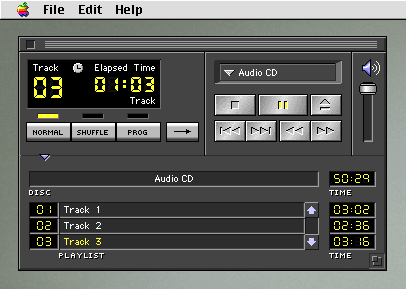“Guys like us avoid monopolies”: Believe it or not, that’s what Bill Gates said about himself and Steve Ballmer today at the D conference.

After emerging from a colorful academic career at Crazy Go Nuts University with a computer science degree at the end of 1994, I steered away from the opportunities available to a junior developer at the time — maintaining mainframe and minicomputer software for banks, insurance companies, and other large enterprises — and instead joined an upstart company that paid its employees $12.50 an hour to make multimedia applications.

The company was called Mackerel Interactive Multimedia, and they’d made a name for themselves in the design community by making some of the most clever interactive brochures and kiosks of that era, and were starting to take on bigger clients. You have to remember that this was back when many computers didn’t have sound cards, never mind CD-ROM drives and modems, and Netscape had just released the 1.0 version of this new software called a “web browser”.
Mackerel’s goal was to make the next Myst or similar multimedia hit. In order to pay the bills while we worked towards that endgame, we made multimedia apps for clients. These were typically interactive advertising or educational pieces that would eventually be distributed on CDs or even multiple floppy disks. As the company’s chief programmer (I was the only one out of a couple dozen rank-and-file employees who had a computer science degree), I’d be brought into meetings with the clients. That’s where I had my first brush with the music industry in its pre-Napster state.
One day during the summer of 1996, one of the founders came into the developers’ bullpen and announced that we’d landed a contract with an independent record label belonging to a major record company.
“Isn’t that a contradiction in terms?” I asked.
Apparently it wasn’t. The label turned out to be a new branch of the major record company that presented itself as an indie for street cred with both its acts and the music-buying public. In spite of their Hot Topic-level authenticity, we thought they’d make an interesting client, and the money was too good to pass up.

The exec that the label sent to visit was a woman who gave off more of a business school vibe than a rock vibe. She peppered her speech with business-school-isms like “target audience” and “units sold”. She used the word “product” several times, and I don’t recall her using the word “music” or even “album” once. It seemed that everything she knew about music didn’t come from being a fan; it came from what she’d read in market research reports.
“That’s why they don’t call it show art,” one of the creative directors quipped.

One of the goals of this initial meeting was to brainstorm some ideas for interactive apps that we could build for them.
I’d been working on an idea that I was rather proud of: CD player apps customized for specific albums. For any CD other than the one for which it was customized, it would show a mostly plain interface, plus some promos for the album. However, if you used the player to play the album for a specific album, it would “come alive” with the album’s lyrics, liner notes, album art and so on. It was an attempt to bring back what was lost in the move from LPs to CDs.
“Nice try, kid,” said the exec with great disdain. “We did some market research and we’ve determined that no one will ever listen to music on their computer.”
“People see them as machines for getting work done. We’re aiming for the rec room, the den, the living room and the bedroom, not the home office. You computer guys are aiming for home office.”
“You sure about that?” our production manager asked. “We all use the CD players on our machines. For some of us, our computers are in our bedrooms and living rooms, and they’re also our primary stereos now.”
“That may be true for you,” she replied, “but you guys are the exception. Computers are great, but they’re office equipment. You don’t keep a typewriter or photocopier in your living room, so why would you have a computer there? And that’s where people listen to their music. Office equipment and entertainment: apples and oranges.”
“Trust me – I’ve been in the music industry for a while – no one’s going to listen to music on their computer.”
Other people at the meeting presented their ideas, and she shot them down as well, with the same dismissive contempt.

At some point during the increasingly futile brainstorming session, I remembered something that I’d brought back from the Macromedia User Conference. I reached into my laptop bag and fished out a floppy disk.
“Here, check this out,” I said, slotting the diskette into my laptop. “It’s something called Shockwave, which lets you embed multimedia applications inside web pages.”
“We don’t think there will be much interest in the world wide web outside of technical people. The pictures are tiny, you’re stuck with default fonts, and your customers have to go buy a modem. Too much tech hassle, too little payoff.”
“You should give this a look,” I insisted. “The company that makes the tool we use to write multimedia software is using MPEG-1 layer 3 [the term “MP3″ hadn’t made common parlance yet] compression to squeeze music files into less space. There’s a small multimedia program on this floppy, and a whole three-minute song. It would normally take about 8 floppies to hold this song.”
I put the disk in my laptop and launched the Shockwave application, which started a tune playing.
“Sounds like crap,” she said. “And who’s the band? The Spin Doctors? They’re so over.”
“Ignore the band,” I said, trying to remain patient. “Just think of the possibilities. This three-minute single is only a megabyte in size. It fits on a floppy, which you can hand out, or you’d be able to download it in a reasonable amount of time. The download will be even faster on the new 56K modems.”

“Blah, blah, blah,” she said, making that opening-and-closing hand gesture signifying pointless chatter. “It only means something to you because you’re a techie. I’ve seen the market research, and I will tell you now:
People are not going to be getting their entertainment from computers or the internet. It’s going to come from set-top boxes and MiniDisc recharging stations at their record stores.”
At this point, I decided that discretion was the better part of valour. “Well, you seem to have all the market research, so maybe the best thing would be for you to come up with ideas for an interactive application, and then we can hammer out the details with you in a later meeting.”
“I think that would be a good idea,” she said. She rose from her seat to leave the room, shaking her head.
“I don’t know about you,” I said to the others after confirming that she was out of earshot, “but I think the music industry needs to be destroyed.”
I’ve been using Firefox 3 beta, which is the default version provided with Ubuntu 8.04, a.k.a. “Hardy Heron”. It’s quite good, but it’s hard to tell which plugins are compatible with it. Luckily there’s this guide — 20 Top Add-Ons that are Ready for Firefox 3 — covers some of the most useful Firefox 3-compatible plugins out there.
Over at Ruby Inside, there’s an article titled 21 Ruby Tricks You Should be Using in Your Code will all sorts of useful code snippets. Even if you code in Ruby every day, there just might be a trick or two you haven’t seen before!

I took this shot of Darren Rowse at the b5 Ranch outside Austin, Texas in March 2008.
The photo is from this entry in my personal blog, The Adventures of Accordion Guy in the 21st Century.
My fellow b5er Darren Rowse, of ProBlogger and Digital Photography School fame, was featured in a Chicago Tribune article titled Blogging Paying off for a Few, which takes a look at how some people have been making a living through blogging.
Here’s the part of the article featuring Darren:
In Melbourne, Australia, Darren Rowse has been generating a six-figure income since 2005 from ProBlogger.net and several photography blogs. His blogging career started as a hobby four years ago, when, as a minister, he blogged about starting a new church, he said. That blog led to another; soon Rowse had 20 different blogs, but most didn’t generate enough interest so he shut them down.
When Rowse launched ProBlogger.net to offer advice to other bloggers in 2004, he hit on a need in the marketplace, he said. ProBlogger’s revenue comes from advertising, affiliate marketing, sponsorships and job boards, he said.
“In the early days, I had to be quite proactive,” he said. “As it grew, I found advertising agencies would come to me.”
His experience spurred him to co-found b5media, a Toronto-based network of more than 350 blogs in 15 areas of interest that draws more than 10 million visitors a month. The collective power of b5media attracts advertisers, and the company pays writers to produce blogs for the network, Rowse said.
To be successful, the blogger must be knowledgeable about the topic. It also helps if you’re passionate about it, he said. “Can you see yourself blogging about this topic every day? Quite often, people do it only for the money and can’t sustain it,” Rowse said.
Links
- Chicago Tribune: Blogging Paying Off for a Few
- ProBlogger.net
- Digital Photography School
- and of course, b5media!
Local tech evangelist David Crow points to The Adventures of Johnny Bunko: The Last Career Guide You’ll Ever Need. Unlike What Color is Your Parachute? or Who Moved My Cheese?, Johnny Bunko is in manga form — that’s right, it’s a Japanese-style comic book.
An unusual book needs an unusual promo, and Johnny Bunko is no exception — it’s got a trailer!
In a review at Amazon, Donald Mitchell provides a quick summary of the book:
Most career writers when they want to simplify a message use a fable, with a few illustrations that show the key perspectives. The fable is clearly secondary to the details.
In The Adventures of Johnny Bunko, the story is more interesting than the advice. Having read a lot of Mr. Pink’s writing, I thought I knew what he would probably advise. But I didn’t realize that he would make the story so interesting, and that the manga format would add so much power to the story telling. Nice work!
What’s the advice? Let me rephrase to make it clearer to you:
- Don’t be rigid about planning out each step well in advance . . . it’s not possible to do.
- Build on what you’re good at (Peter Drucker originated that one) and avoid relying on what you aren’t good at.
- Focus on what you can do for others (start with the boss) rather than what’s in it for you (you can read more about this in How to Be a Star at Work).
- Keep at it. Practice makes perfect.
- Take on big challenges and learn from them.
- Make a difference.
I think I’ll pick up this book — it’s pretty cheap, and I’d like to see how Daniel Pink uses the manga format to advantage.
More Advice from Daniel Pink
Here are some video clips featuring Daniel Pink some pretty interesting giving career advice…
Abundance, Asia and Automation
Pink says that the really useful skills are those that are hard to outsource, hard to automate and that serves a need that goes beyond functional. And those skills are the right-brain ones — the ones often derided as “soft skills”.
Help! My Resume Has Too Many Jobs!
Don’t worry if your resume looks like it has too many jobs on it — the world of work today doesn’t give out prizes for lifetime service. These days, it’s about whether you can solve their problems.
Exercise Creativity at Your Job
The old adage applies: “It’s often better to ask for forgiveness than permission.” And from my own experience, I can tell you that he’s right.
Choosing a Major
Follow your interests — don’t choose a major based on what kind of job you think you’ll get after you graduate. The job market is likely to change! Follow your passion instead. You should also work on your “high concept” and “high touch” skills.
In his article, Laid off? The one thing you absolutely need to do on the first day, Jason Kester suggests that “the single most important thing to do as soon as you make it back to your house with that box full of stuff is to book a flight. Read the article for his reasons why.